With an electric vehicle, you can skip the lines at the gas stations, but that doesn’t mean it’s free to fill up. Whether you fill up your electric car at a public charging station or you have an EV charger at home, you’ll still need to pay for the electricity. Here’s everything you need to know about how much it will cost to charge your EV at Tesla Superchargers, Electrify America, EVgo, ChargePoint, and in-home chargers.
How Much Does a Public EV Charging Station Cost?
Most public EV chargers in the US will cost between $0.30 and $0.60 per kilowatt-hour of electricity you use. While prices will vary depending on location, it should cost anywhere from $15 to $30 to fill an electric car to 80%, assuming your battery capacity is 60 kilowatt-hours.
Read More: EV charging guide
There are some free public charging options, but most locations will either charge by the kilowatt-hour (kWh) or by the minute. Many public chargers will also have “time of use” pricing, which means it will cost more to fill up your EV during peak hours or when demand is higher.

Some states only allow the utility companies to sell electricity by the kilowatt-hour. In Michigan, Nebraska, Tennessee, Wisconsin, and other states, you’ll pay for EV charging in tiers. These tiers will be based on how long you spend at the charging station and the maximum charging speed of your electric vehicle.
For example, a short-range Tesla Model Y only charges at a maximum of 170kW. So, if you use a Tesla Supercharger that charges by the minute, you will pay at Tier 3 rates. All long-range Tesla owners can charge up to 250kW, so they will need to pay tier 4 rates.

When it comes to finding a level 3 public charging station near you, there are currently four main options: Tesla Superchargers, Electrify America, EVgo, and ChargePoint.
How Much Do Tesla Superchargers Cost?
The rates at every Tesla Supercharger station are different, but you’ll typically pay between $0.40 to $0.50 per kilowatt-hour. That means it can cost as little as $20 to charge a short-range Model 3 to 80%. For larger models, like the Model S and Model X, it could cost $40 or more to charge up to 80%.
Read More: How long does it take to charge a Tesla?
To find out how much it costs to charge your EV at any Supercharger location in the US, check out this map from Tesla.
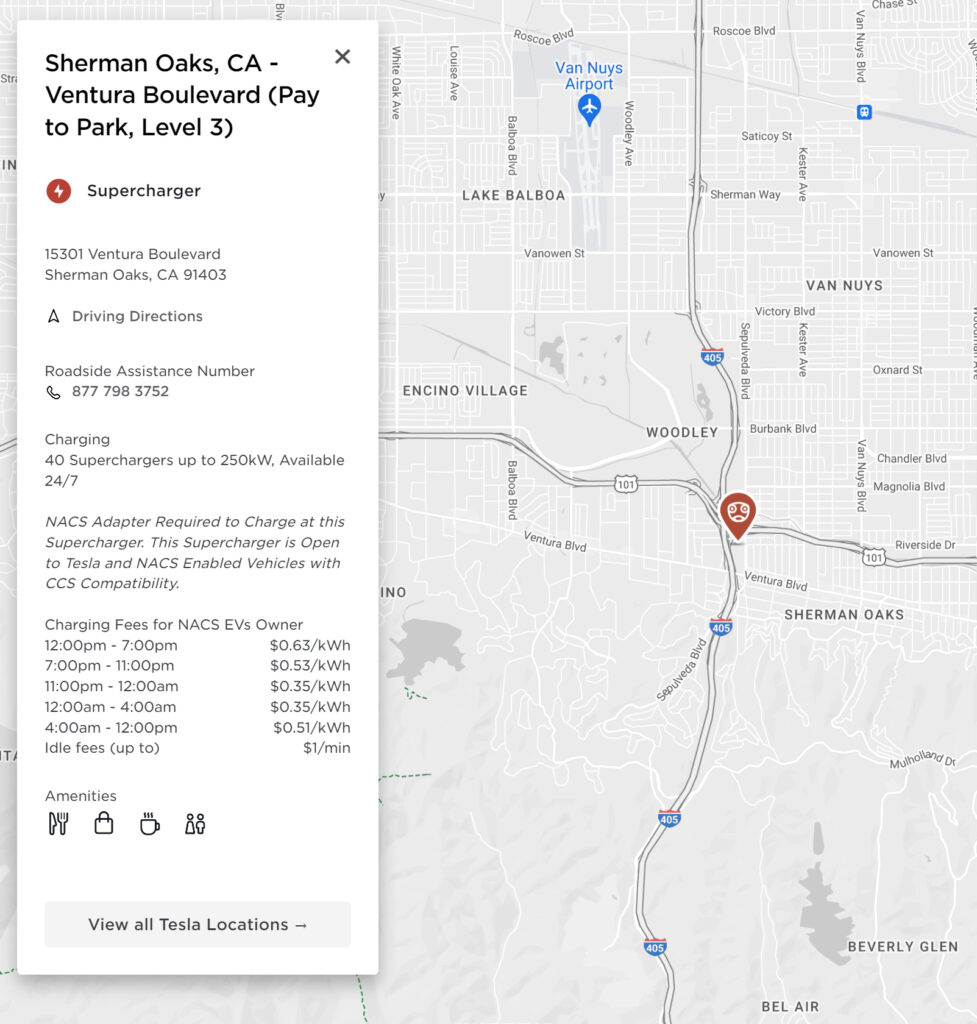
Tesla also charges an idle fee to reduce wait times at charging stations. In the US, you need to pay $0.50 for every minute your electric vehicle is connected to a Supercharger without charging. However, this fee is only applied if the station reaches 50% capacity. When a station is 100% full, the idle fees double to $1 per minute.
If you own a Tesla, your payment will be automatically processed from your Tesla account after disconnecting from a Supercharger. If have any other kind of electric car, you’ll need to pay using the Tesla app at most stations. However, there are some Superchargers that still accept credit cards or other mobile payment services.
How Much Does Electrify America Cost?
The rates at Electrify America charging stations vary, but the standard rate for Pass members was recently increased to $0.48 per kilowatt-hour and $0.36/kWh for Pass+ members. So, it should cost at least $18 and $23 to fill up your batteries to 80%, assuming your EV has a battery capacity of 60kWh.
However, many Electrify America stations are more expensive, so make sure to check out their smartphone app to find out how much it will cost to charge your EV at any location.
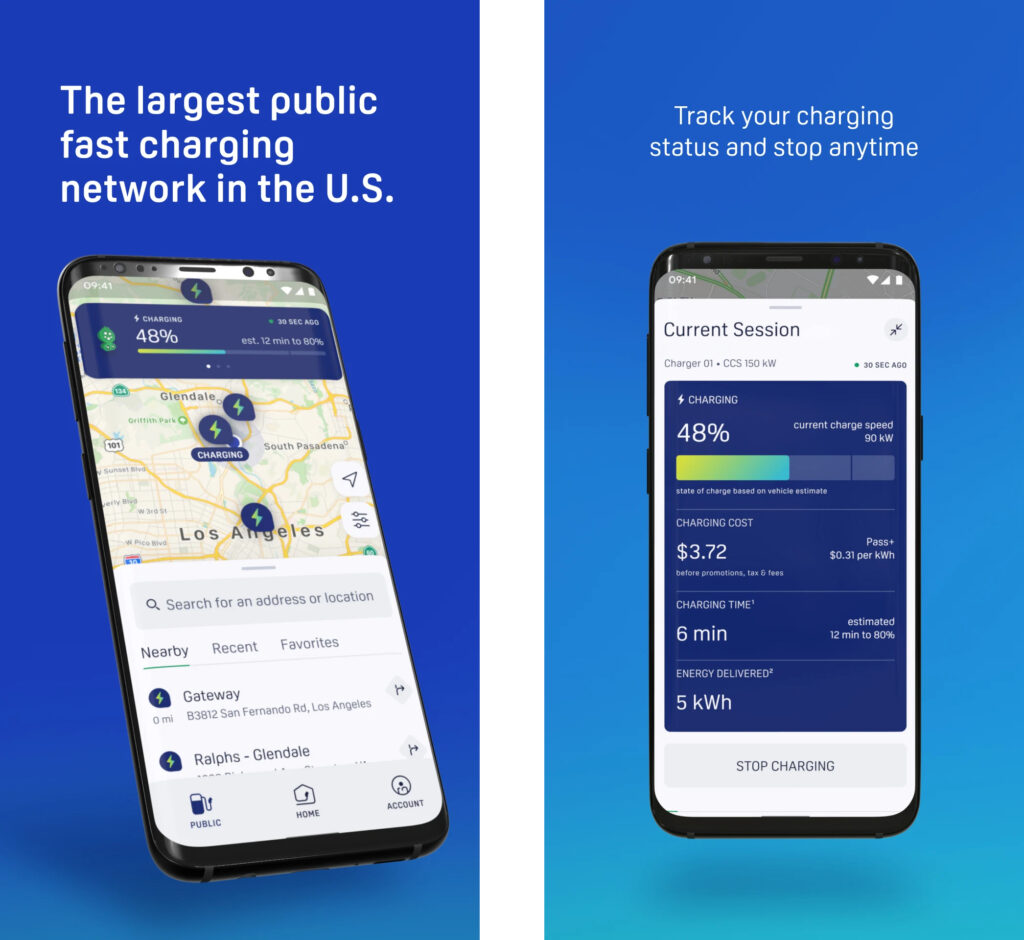
Electrify America only charges per kilowatt-hour in 29 states plus Washington. DC. In all other states, you’ll need to pay per minute and based on the maximum charging power your electric vehicle can accept. These rates are measured when you plug your EV in, and they don’t change until you unplug.
There’s also an idle fee of $0.40 per minute after your EV stops charging and you are still connected to the charger. If you become a Pass+ member, you’ll save 25% on charging rates with a $4/month subscription fee. Non-members can pay at any station using credit/debit cards and other mobile payment services.
How Much Do EVgo Chargers Cost?
The rates at all EVgo stations are different, but non-members will pay between $0.34 to $0.49 per kWh, while members can pay as little as $0.23 to $0.33 per kWh. That means non-members will pay $16 to $23 to fill up a 60kWh battery to 80%, while members will only pay $5.50 to $8.
To find out how much it costs to fill up at any EVgo public charging station, check out their smartphone app.
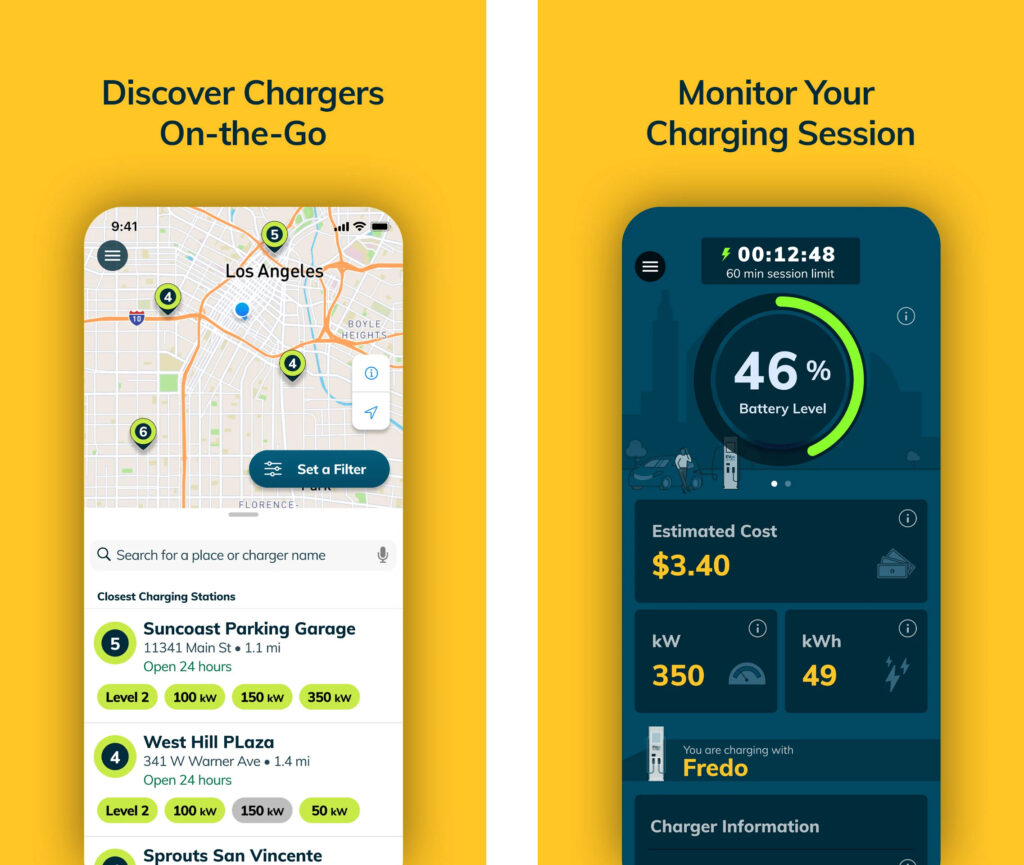
EVgo also charges non-members a $0.99 session fee, a $3 reservation fee, and a $2.99 transaction fee when you pay with a credit card. EVgo subscriptions start at $0.99 a month for the Basic plan, $6.99 a month for EVgo Plus, and $12.99 a month for EVgo PlusMax. Each plan offers cheaper charging rates, fewer fees, and other benefits.
How Much Does ChargePoint Cost?
All of the charging stations in ChargePoint’s public network are independently owned, and prices are set by the owners, not ChargePoint. So, you might be able to find free EV chargers near you, but you’ll usually need to pay per kWh and per hour at most ChargePoint stations.
To find how much it costs to fill up at a ChargePoint location, download their smartphone app.
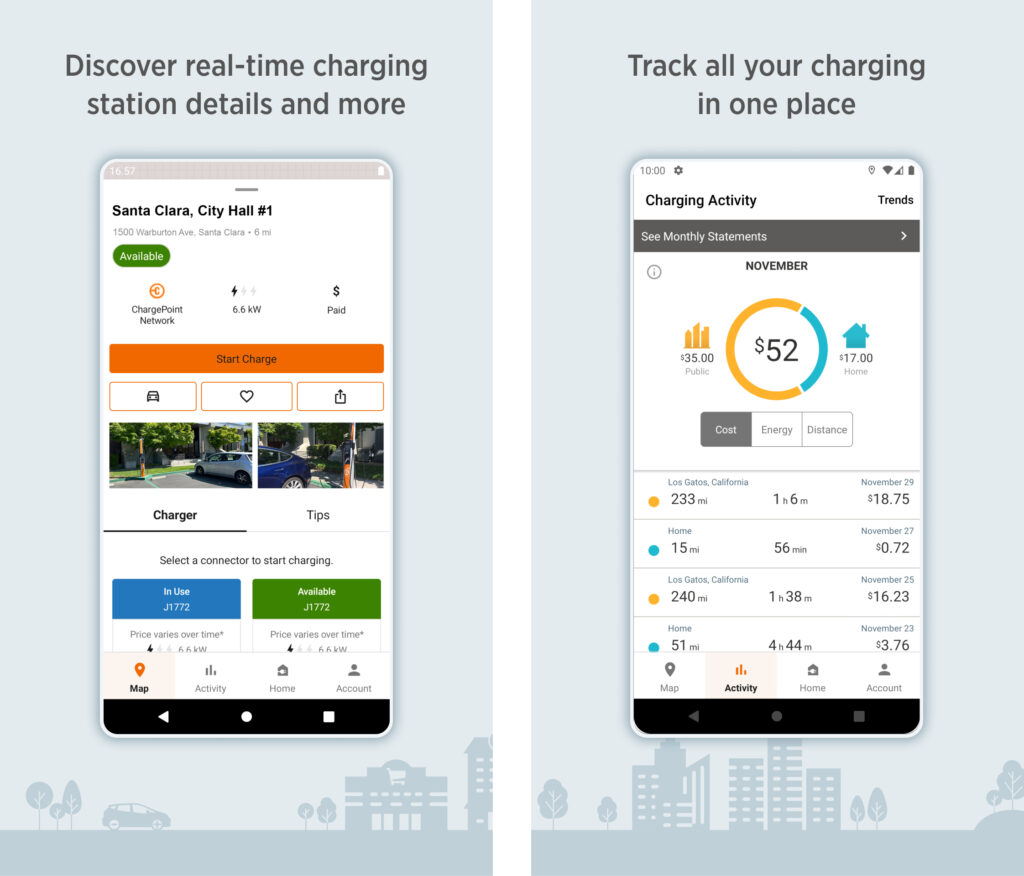
However, some chargers that you can find in the app are actually owned by businesses and hotels, and you’ll need to be a customer or a guest to use their EV chargers. When you arrive at the charging station, you might also see different prices, but ChargePoint says you only pay the price that’s listed in the app.
How Much Does It Cost To Charge an EV at Home?
The average US household pays $0.17 per kilowatt-hour of electricity, which means it should cost around $10 to fully charge an EV with 60kWh battery capacity. Since Americans drive an average of 1,123 miles per month, charging an EV at home should cost around $60 per month, assuming your EV gets 3 miles per kWh.
To compare, the average price of gasoline in the US is now $3.35 per gallon. Since combustion cars only get 25 miles per gallon on average, it would cost around $150 to fill up at the pump every month. That means charging your EV at home should save you at least $90 a month (over $1,000 a year).
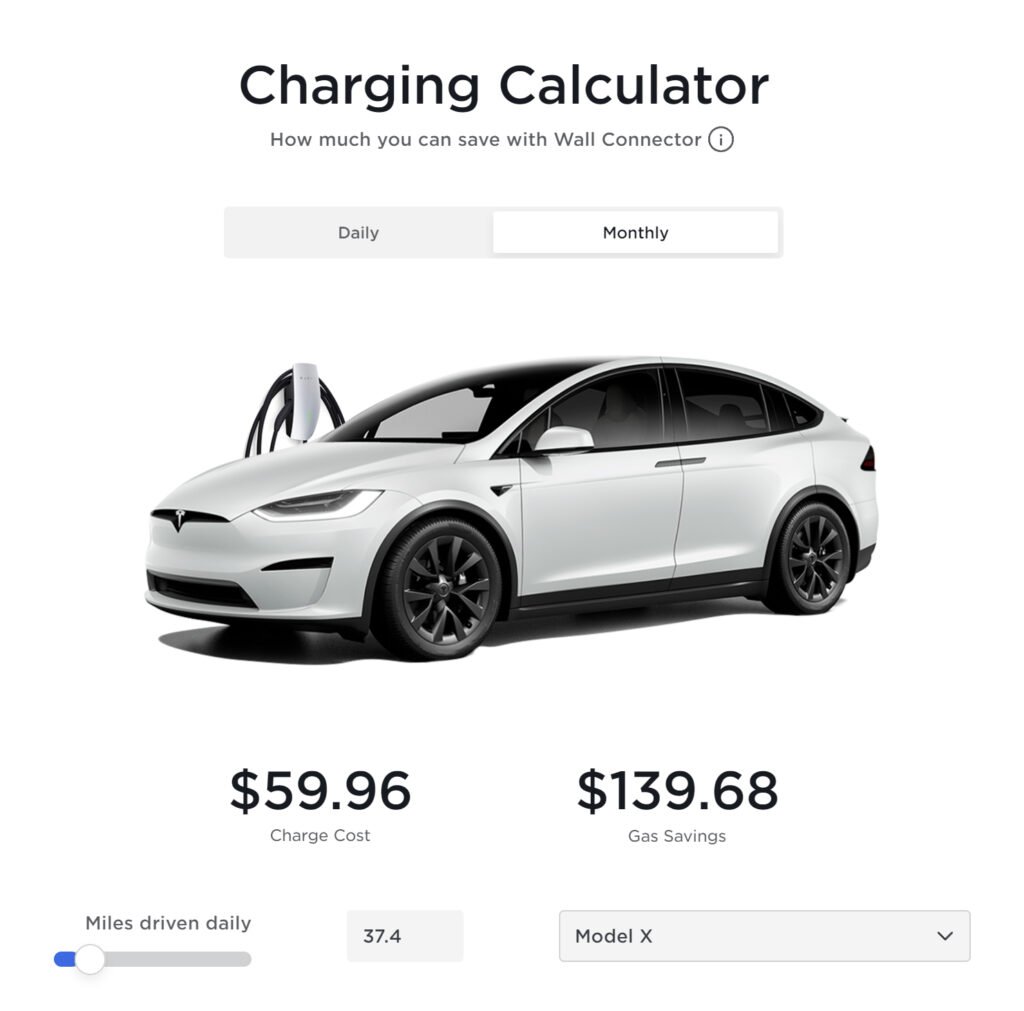
To calculate how much it will cost to charge your EV at home, all you need to do is find your battery capacity (measured in kilowatt-hours) and multiply it by your local electricity prices (measured in dollars per kilowatt-hour).

Some EVs are more efficient than others, so you might get between 2-5 miles of range every 1kWh of charging. Plus, it can cost more to charge your EV depending on the state of your battery, the temperature, local energy demand, and other factors.
Time of Use Plans
Charging your electric car at home will cost significantly less at night when energy demand is lowest. Many utility companies will even offer “time-of-use plans,” which means you’ll pay even less for using electricity during off-peak hours.
For example, if you live in California, charging your EV might cost $0.63/kWh during peak hours in the summer, but you’ll pay less than half of that during off-peak hours. That means California drivers could save around $145 a month just by charging at the right time.
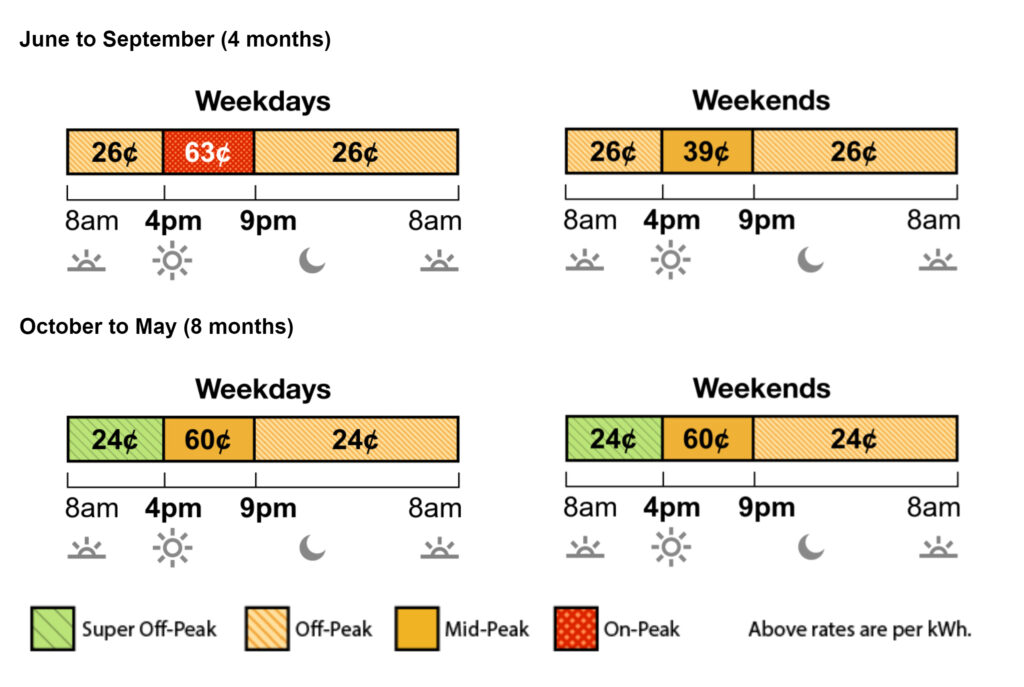
However, these time-of-use plans usually need you to sign up and meet certain requirements to be eligible. You can contact your local power company or a licensed electrician to find out more about the programs and incentives in your area.
How Much Does an In-Home EV Charging Station Cost?
You should expect to pay $500-$750 for a decent level 2 EV charger. While you can find models that start as low as $300 or less, they are usually not as safe or easy to use. You can also find level 1 and level 2 cables for around $100-$250, but they usually won’t charge your EV as fast.
Read More: The best EV chargers to install in your home
How Much Does It Cost To Install an EV Charger?
To install an EV charger in your home usually costs over $1,000. This price includes permit fees, but it doesn’t include the cost of the EV charger itself. In total, you should expect to pay at least $1,500-$2,000 to install a level 2 wall charger in your home.
If you already have a 240-volt plug in your garage, you might be able to plug a wall charger in and start using it right away. It’s a lot cheaper and easier to install, but you should still contact an electrician to make sure your home’s electrical system can handle an EV charger.
If you’re thinking about installing an EV charger in your home, HelloTech can send someone to provide a free in-home estimate. Our electricians will check your circuit breaker, assess the proposed installation location, and answer any EV charging questions you have – all for free.


